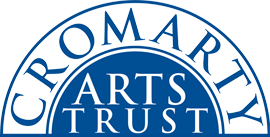sir thomas' life and times
Thomas was born in 1611, in Aberdeenshire, the eldest of the eight children of Sir Thomas Urquhart of Cromarty. He matriculated at King’s College, University of Aberdeen, aged 11, where he studied classics and maths. From there (he did not graduate) he went to the continent of Europe, where he travelled in France, Spain and Italy and may have taken part in military campaigns.
He was back in Cromarty by 1636, living in Cromarty Castle. His father had by now acquired enormous debts, so with the help of his brother, Thomas locked him up briefly in the castle to stop him spending money. According to Thomas, his father was a good, but gullible, man who was habitually cheated by tradesmen and others. While in Cromarty, Thomas continued his abstruse studies ‘such as optical secrets, mysteries of natural philosophy, reasons for the variety of colours, the finding out of the longitude, the squaring of a circle, etc. etc.’
1639 saw the beginnings of the covenanting wars. The Urquharts were an Episcopalian and Royalist family, and Thomas took part in a successful Royalist attack on a Covenanting force at Turriff - the first battle of the Civil War. After the Trot of Turriff, they captured Aberdeen, only to lose it a few days later, and Thomas took ship for London. He moved in court circles there and was knighted by Charles I in April 1641. In the same year, he published the very undistinguished Epigrams: Divine and Moral.
He returned to Cromarty in1642 after his father’s death to take over the debt-burdened estate. He went abroad for three years, returning in 1645 to find the estate in even worse condition, and he was constantly under siege from his creditors - preventing him, he said, from producing countless inventions for the benefit of mankind. He did, however, publish in 1645 his Trissotetras - a totally impenetrable treatise on mathematics.
Charles I was beheaded in January 1649, and a month later Sir Thomas took part in a short-lived Royalist rising which captured Inverness and dismantled its fortifications. He was declared a rebel by the Scottish Parliament but later pardoned.
In 1651 Charles II was crowned King of Scotland at Scone and Sir Thomas joined a Scottish Royalist army which marched to England where they were defeated by Cromwell’s army at the Battle of Worcester, and Sir Thomas was locked up in the Tower of London and then in Windsor Castle before being released on parole and allowed to return to Cromarty in 1652. He had taken all his papers with him to Worcester, and he writes of how he had ‘above ten thousand crowns worth of papers embezzled without recovery’. The Roundhead soldiers threw his papers into the street where they were used by grocers and pie-makers, for lighting pipes and for ‘inferior employments and posterior uses’.
Though released on parole, his estate was declared forfeit unless he could show that he possessed ‘merits and services’ that could be taken into favourable consideration. Accordingly, over the next three years he published three works designed to show his outstanding qualities - namely Pantochronochanon, an astonishing genealogy tracing his ancestry back to Adam and Eve; The Jewel, an introduction to a universal language as well as a series of biographies of eminent Scotsmen (especially the Admirable Crichton); and finally Logopandecteision, an attack on his creditors, bankers, lawyers and presbyterian clergy - all of whom are guilty of preventing him achieving his own, and Cromarty’s, true greatness.
He was constantly in dispute with the local presbyterian clergy of the churches of Cromarty and Kirkmichael.
In 1653 he finally did publish a work of lasting genius - his translation of Gargantua and Pantagruel by the French writer Rabelais. Thereafter, little is known of his life. He is known to have gone abroad, and is thought to have died in 1660 - supposedly in a fit of laughter on hearing the news that Charles II had been restored to the English throne.
